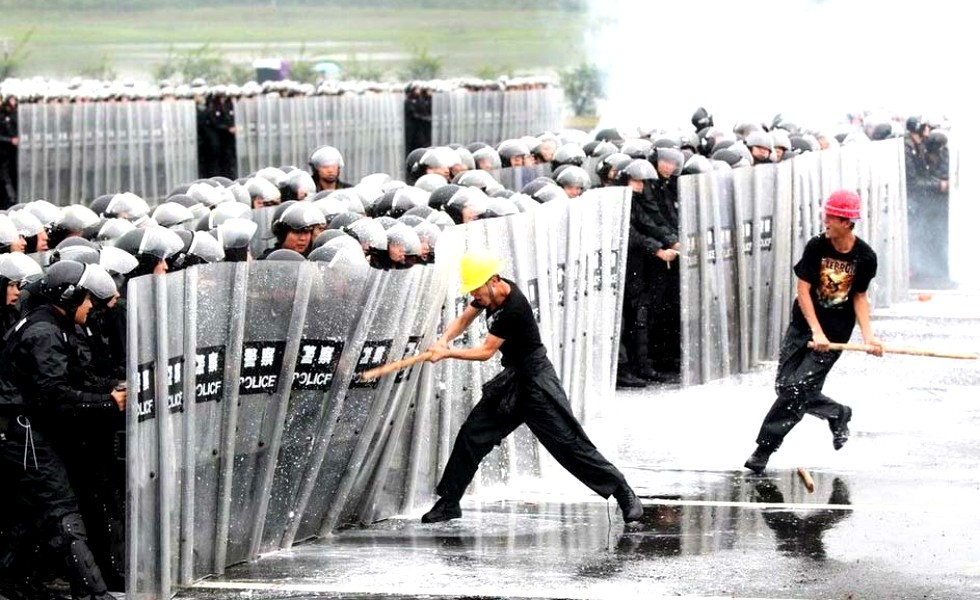Filed under: Capitalism, Community Organizing, Development, Indigenous, International Coverage, Labor, Land, The State

Submitted to It’s Going Down
I’m a Pacific Northwest-based anarchist who recently visited my partner’s family in a small inland city in the People’s Republic of China. While there, I had a handful of truly striking encounters with labor militancy, a phenomenon that has only received a small trickle of coverage in the West. While IGD usually keeps its coverage limited to North America, I figured that a look at resistance to the world’s largest ongoing capitalist transformation would be worth sharing.
China is currently the site of tremendous contradictions, with the coastal regions home to both a fabulously wealthy bourgeoisie and a massive migrant urban working class. Worker resistance in coastal factories has received some attention in the west, most notably in the book China on Strike. What has received even less attention both in China and in North America, and what I hope to shed a bit of light on, is the rising militancy of China’s massive rural peasantry. Facing issues endemic to capitalist development such as the breaking up of and theft of common lands, confronting intense repression from the Chinese state, and complicated in the particular region I visited by the fact that numerous rural areas are populated by non-Han Chinese ethnic minorities, there is undoubtedly a sense that something big is brewing in the world’s largest country, and what happens there will undoubtedly have global repercussions.
Yangshuo County, China
On its face this region of China has prospered from a tremendous tourism boom. The stunning natural beauty of the surrounding forests, rivers, and mountains draw countless tourists from around China and the world. The central town of Yangshuo is crossed by streets with flashing neon lights, lined with dozens of hotels and restaurants both Chinese and Western. Among the most popular attractions in the surrounding area are river rides where a single boatsman gently maneuvers a couple up and down the Yulong river on a small bamboo raft. Beneath the calm surface of the water, though, lies a tale of exploitation characteristic of China’s transition to capitalism.
My partner and I visited Yangshuo amidst a larger trip to their hometown a few hours away. Early in the morning we drove out to the river and, after purchasing tickets from a booth, headed to the bank and met the pilot. Once on the slowly rolling water we quickly sank into relaxation. Flanked by lush green mountains and blessed by a sunny day, I made an idle comment on the beauty of the surroundings. The pilot’s response quickly broke the spell.
“What does all the beauty really do for us?”
Seven or eight years ago, the pilot’s village, Xinglong, came together to collectively build a dock of the same name in order to develop a means of benefiting from the fast-rising tourism industry in Yangshuo and nearby Guilin. Jobs in Yangshuo itself could only be had through family connections, while the young people from the village were leaving to big cities in droves to find factory work, an option unavailable to their elders. From the outset there were issues around money flowing in, with the government demanding a large cut in taxes, but the pilots’ share of a fare and the number of trips available in a day were more than enough to make a living.
All of this changed three years ago when those in power realized the lucrative potential in controlling the dock and similar ones built by other villages. The county government stepped in and ordered the village to give them control of the dock for a price far less than its value. The villagers believe that the government did not intend to actively manage it, but instead acted as a front for various moneyed interests or organized crime. Whatever the case, the price itself was never actually paid but the village still lost control of the dock and a wide swath of surrounding communal land.
As the pilots’ share of the boat fare continued to decrease, villagers turned to collective strike actions. Such measures have become increasingly common throughout China, in spite of their illegality, as abuse and exploitation have grown along with the economy.
The largest strike took place two years ago. For five days surrounding the National Holiday in October, hundreds of boat pilots withheld their labor and congregated on the banks of the river in protest. Their demands were not entirely specified but revolved around better pay and treatment.
Early in the strike the local police chief arrived with a camera, presumably to photograph strikers for future identification and retaliation. In response the striking pilots pushed him into the river to get rid of the camera. Later on, around a hundred riot police arrived but took no action. They were armed with batons and shields.
The strike was ultimately ended not through violence but the use of scabs. With poverty rampant among strikers and no formal organizations to help keep their needs met through the strike, some of the pilots were bribed to resume work. With some of their coworkers back on the river, the remainder were ultimately forced to give in. The resumption of work, though, did not mean the government had forgotten what took place. Some of the scabs had been coerced to give the names of pilots central to organizing the strike. A few weeks after work resumed, dozens of police entered the village by night, broke into the homes of the organizers, and arrested them. One was the head of the village, who was sentenced to three years in prison and remains there. The rest of those arrested are also still imprisoned with even longer sentences.
Other strikes have followed, but the brutal crackdown by the government has had a chilling effect on the workers’ willingness to continue fighting. While searching for ways to eke out more of a living, the pilots at Xinglong pooled their money to buy cameras and build a small building to take pictures of boat riders. In response to a recent protest police burned the building down. The pilots have also tried to work within the system, but have been ignored. They pooled their money and were able to send two hundred of their number to Beijing to petition the central government, but their petition fell on deaf ears. They have also failed to attract any media attention, perhaps due to the fact that they are standing against the local government in a country with tight media censorship.
As the situation stands, many pilots see little hope. Both collective direct action and the use of official channels to protest the theft of their village’s common land and their own livelihoods have failed to produce any results and have instead resulted in severe repression. Pilots are currently only given 35 yuan out of a ticket that costs 180, and are frequently allowed only one or even no fares per day. Yet they have few other options. Jobs in the local urban areas are virtually impossible to find without connections, while work in the factories in coastal provinces almost always goes to younger laborers.
Despite all of this, and with great fear, the pilots fight on. They are not alone. Workers in many of the other tourist industries throughout Yangshuo County, from pilots at many river docks to vendors and laborers in the numerous indigenous minority villages frequented by tourists, continue to strike in the face of repression. Workers at one popular tourist attraction recently went on strike only to have all three hundred of them arrested.
Chinese worker militancy in industrialized coastal-provinces has received some attention in the West. Clearly labor unrest is not confined their. With little international, or even domestic, attention, worker resistance to China’s ongoing capitalist transformation has become endemic in rural areas.
A tide is rising, and the only question is how high it will surge.







